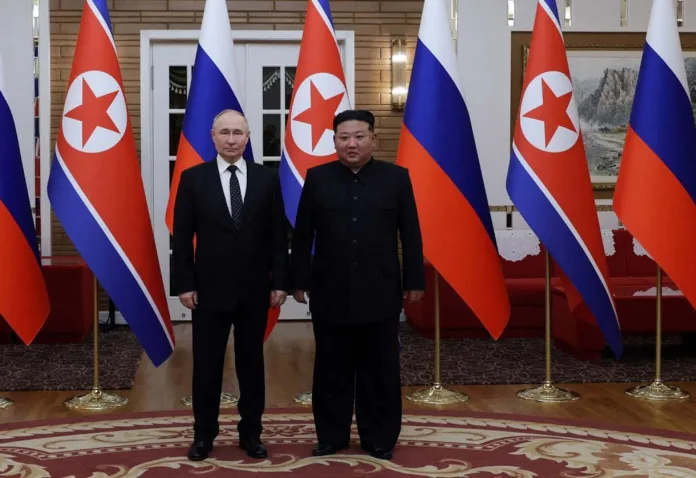Recent allegations by Ukraine have brought forth a sensational claim that North Korean soldiers, equipped with counterfeit Russian military identities, are operating on Ukrainian soil as part of Russian logistical support. This revelation, if verified, could unravel a series of complex geopolitical threads, highlighting illicit military collaborations and expanding the narrative of the Ukraine conflict.
Historically, military partnerships in covert operations are not a new phenomenon; however, the international community views such alliances, particularly involving North Korea, with considerable trepidation. This is due to North Korea’s isolated stance and notorious history of defying international norms, particularly around military conduct and nuclear proliferation.
From a diplomatic perspective, the potential involvement of North Korean troops adds a new, fraught layer to the already tense relations between Rus sia and the Western states supporting Ukraine. North Korea’s participation, even tangentially, could warrant severe international reactions, potentially es calating into economic sanctions or diplomatic isolation measures specifically targeting Pyongyang.
These developments could signal a shifting dynamic in global alliances, where rogue states, often sidelined in international diplomacy, find new ventures for cooperation under the aegis of mutual benefit in hostility towards Western pow ers. Analysts speculate these alignments might reflect a growing desperation or strategic recalibration as major nations reassess their geopolitical interests in light of a prolonged and costly conflict.
The international community has called for rigorous investigations led by en tities like the United Nations, to verify these claims. The presence of hard evidence could lead to swift, coordinated international responses. Legal experts remind us that unauthorized military engagement breaches international law, providing legal grounds for proceedings against those complicit in enabling such collaborations.
Conclusively, these allegations against North Korea, though still needing con crete evidence, emphasize the fragmented and unpredictable landscape of modern warfare alliances. They underscore not only the complexity of the Ukraine conflict but also the lengths to which nations might go to secure tactical advantages, irrespective of legal or ethical ramifications. The unfolding narrative not only threatens to deepen existing geopolitical divides but also challenges the efficacy of traditional diplomatic frameworks in mediating contemporary conflicts.
Perspectives
Perspective 1: Military analysts, drawing from Jane’s Defence Weekly and Stratfor reports, suggest that this potential collaboration between Russia and North Korea might be more symbolic than strategically effective. They posit that while North Korea could provide manpower, logistical support, and minor tactical benefits, the alliance is unlikely to decisively alter the dynamics in Ukraine’s favor of Russia. This could reflect more on political signalling than military necessity, illustrating Putin’s strategic in tent to exhibit diminished global isolation by aligning with any semblance of support, however marginal or contentious.
Sources:
Perspective 2: Geopolitical analysts from the Carnegie Endowment for International Peace and the Council on Foreign Relations emphasize the ramifications of North Korea’s alleged involvement in the conflict, warning of possible destabilization in the Korean Peninsula. If confirmed, these actions could invite increased military preparedness in the region, with South Korea and allies like the United States potentially strengthening their defence postures. Additionally, this global political shift might provoke realignments within UN member states, particularly those advocating for sanctions under comprehensive geopolitical lenses.
Sources:
Perspective 3: Legal scholars from the International Institute for Strategic Studies and the European Council on Foreign Relations assert that the accusations indicate potential breaches of international law, calling for a robust, independent inquiry. They underline the necessity of accountability mechanisms to uphold international legal standards, cautioning that failure to do so risks undermining the rule of law globally. Such violations should prompt diplomatic, economic, and potentially punitive responses against perpetrators, reinforcing principles delineated in global treaties like the UN Charter.
Sources:
